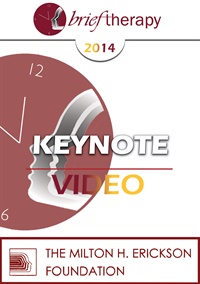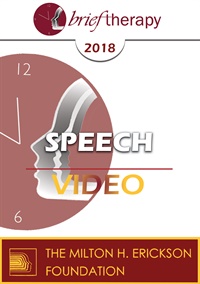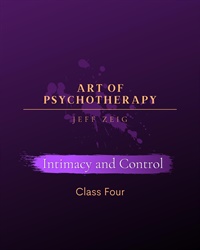
- Average Rating:
- Not yet rated
- Topic Areas:
- Utilization | Clinical Demonstrations | Psychotherapy | Therapist Development | Intimacy | Psychosomatics | Communication
- Bundle(s):
- Art of Psychotherapy - Utilization Series
- Categories:
- Art of Psychotherapy
- Faculty:
- Jeffrey Zeig, PhD
- Course Levels:
- Master Degree or Higher in Health-Related Field
- Duration:
- 2 Hours 22 Minutes
- Format:
- Audio and Video
- Original Program Date:
- Jul 12, 2020
- Short Description:
- For the final class in the Utilization series, Patricia joins us to discuss her preference for being in control, and how that relates to her struggles with intimacy. She also requests help alleviating a psychosomatic response from an earlier trauma. Dr. Zeig uses an interpersonal approach to this session, utilizing verbal and body language techniques to help communicate complex concepts. Zeig establishes the theme of appreciate as the through-line for this session.
- Price:
- $79.00 - Base Price
- Average Rating:
- Not yet rated
- Topic Areas:
- Clinical Demonstrations | Brief Therapy | Couples Therapy | Intimacy | Adlerian Therapy
- Categories:
- Brief Therapy Conference | Brief Therapy Conference 2006
- Faculty:
- Jon Carlson
- Course Levels:
- Master Degree or Higher in Health-Related Field
- Duration:
- 50:42
- Format:
- Audio and Video
- Original Program Date:
- Dec 08, 2006
- Short Description:
- BT06 Clinical Demonstration 02 - Adlerian Brief Couples Therapy to Increase Intimacy - Jon Carlson, PsyD, EdD, ABPP
- Price:
-
Sale is $29.00
price reduced from Base Price - $59.00
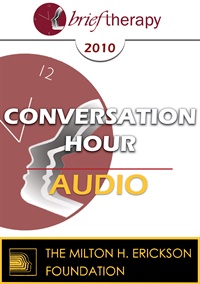
- Average Rating:
- Not yet rated
- Topic Areas:
- Conversation Hours | Brief Therapy | Couples Therapy | Intimacy | Sex and Sexuality
- Categories:
- Brief Therapy Conference | Brief Therapy Conference 2010
- Faculty:
- Esther Perel, MA, LMFT
- Duration:
- 57:04
- Format:
- Audio Only
- Original Program Date:
- Dec 11, 2010
- Short Description:
- BT10 Conversation Hour 05 - Mating in Captivity - Esther Perel, MA, LMFT Mating in Captivity Conversation with Esther Perel
- Price:
- $15.00 - Base Price

- Average Rating:
- Not yet rated
- Topic Areas:
- Couples Therapy | Short Courses | Intimacy | Relationships | Brief Therapy | Psychotherapy
- Categories:
- Brief Therapy Conference | Brief Therapy Conference 2010
- Faculty:
- Robert Johansen, PhD | Ian Johansen, PhD | Todd Gaffney, PhD
- Duration:
- 1:29:17
- Format:
- Audio Only
- Original Program Date:
- Dec 09, 2010
- Short Description:
- This workshop will introduce a new cognitive model for brief, solution-focused psychotherapy for couples. This cognitive paradigm is unique in several ways. It points to the fact that no one knows the client better than his/her intimate partner. The client’s partner pushes, pulls, and teases every imperfection of out their partner’s personality. Specifically, intimacy reveals what is incomplete about the client’s emotional development. It also reveals how effectively the client manages the needs he or she brings to the relationship. This is precisely what clients need to study themselves and points to what we as therapists can do to help our clients. With Robert Johansen, Ian Johansen and Todd Gaffnet.
- Price:
- $15.00 - Base Price
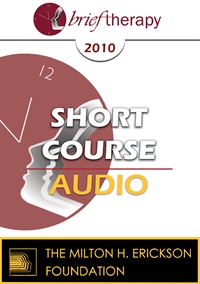
- Average Rating:
- Not yet rated
- Topic Areas:
- Couples Therapy | Short Courses | Gestalt | Intimacy | Relationships | Neurobiology | Neuroscience
- Categories:
- Brief Therapy Conference | Brief Therapy Conference 2010
- Faculty:
- Roberta Karant, PhD | Stefan Deutsch
- Duration:
- 1:33:35
- Format:
- Audio Only
- Original Program Date:
- Dec 09, 2010
- Short Description:
- Couples in distress minimize and numb their pain by avoiding contact. By writing a vision of what they both want, the therapist can focus the couple on the future. By combining Gestalt concepts with those popularized by Hendrix and others, therapists can have a powerful effect on quickening the healing process. New sessions will involve writing, note taking, and an agreed upon assignment to be practiced during the week. With Roberta Karant and Stefan Deutsch.
- Price:
- $15.00 - Base Price
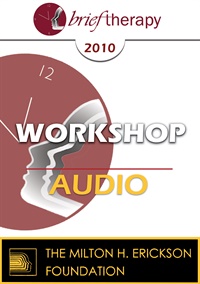
- Average Rating:
- Not yet rated
- Topic Areas:
- Couples Therapy | Workshops | Intimacy | Sex and Sexuality
- Categories:
- Brief Therapy Conference | Brief Therapy Conference 2010
- Faculty:
- Esther Perel, MA, LMFT
- Duration:
- 2:11:17
- Format:
- Audio Only
- Original Program Date:
- Dec 10, 2010
- Short Description:
- BT10 Workshop 28 - The Double Flame: Reconciling Intimacy and Sexuality - Esther Perel, MA, LMFT This workshop probes the intricacies of love and desire—how they relate and how they conflict. Participants will learn how emotional intimacy can inhibit sexual desire and why “good intimacy” doesn’t necessarily make for “good sex.” Through case material and video vignettes, we’ll explore how our emotional history: “how we were loved” shapes our erotic blueprints and expresses itself in the physicality of sex: “how we make love”. We will show how to break through erotic impasses and help couples balance the dual needs for security and freedom. This model applies to couples and individuals from all sexual orientations.
- Price:
- $15.00 - Base Price
Tags: Intimacy Relationships
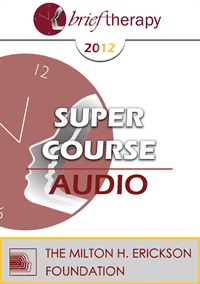
- Average Rating:
- Not yet rated
- Topic Areas:
- Attachment | Neuroscience | Super Courses | Intimacy | Differentiation | Couples Therapy
- Categories:
- Brief Therapy Conference | Brief Therapy Conference 2012 | Pioneers in Couples and Family Therapy
- Faculty:
- Ellyn Bader, PhD
- Duration:
- 1:51:57
- Format:
- Audio Only
- Original Program Date:
- Dec 09, 2012
- Short Description:
- Learn advanced techniques for understanding relationship dynamics, addressing communication challenges, and supporting couples through complex emotional landscapes. Explore attachment styles, therapeutic interventions, and strategies for helping couples navigate conflict, addiction, and personal growth.
- Price:
- $15.00 - Base Price
- Average Rating:
- Not yet rated
- Topic Areas:
- Keynotes | Couples Therapy | Intimacy | Sex and Sexuality | Attachment | Love
- Categories:
- Brief Therapy Conference | Brief Therapy Conference 2014
- Faculty:
- Esther Perel, MA, LMFT
- Course Levels:
- Master Degree or Higher in Health-Related Field
- Duration:
- 59:13
- Format:
- Audio and Video
- Original Program Date:
- Dec 13, 2014
- Short Description:
- Based on Perel’s Mating in Captivity, this bold take on intimacy and sex grapples with the obstacles and anxieties that arise when our need for secure love conflicts with our pursuit of passion. We will tackle eroticism as a quality of vitality in relationships extending far beyond mere sexuality and show how reconciling these two competing needs is at the heart of sustaining desire over time.
- Price:
-
Sale is $29.00
price reduced from Base Price - $59.00
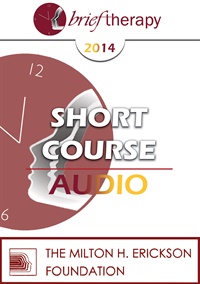
- Average Rating:
- Not yet rated
- Topic Areas:
- Short Courses | Brief Therapy | Couples Therapy | Intimacy | Relationships | Solution Oriented Approach
- Categories:
- Brief Therapy Conference | Brief Therapy Conference 2014
- Faculty:
- Robert Johansen, PhD
- Duration:
- 1:45:02
- Format:
- Audio Only
- Original Program Date:
- Dec 11, 2014
- Short Description:
- The presentation introduces a new, solution-focused model for treating individuals/couples. The model proposes specific and clear steps on how to differentiate types of love and how these impact intimacy. Participants will develop lasting strategies on how to effectively manage personal needs in the context of the intimate relationship.
- Price:
- $15.00 - Base Price

- Average Rating:
- Not yet rated
- Topic Areas:
- Sex and Sexuality | Workshops | Brief Therapy | Couples Therapy | Intimacy | Relationships
- Categories:
- Brief Therapy Conference | Brief Therapy Conference 2014
- Faculty:
- Pat Love, EdD
- Duration:
- 1:42:06
- Format:
- Audio Only
- Original Program Date:
- Dec 12, 2014
- Short Description:
- Human sexual response is a complex system even when attempting to understand one person let alone two people in a relationship. It is helpful, therefore to have a way to organize decades of research and clinical practice in a manner which can be shared with clients. A practical schema will be presented to educate and motivate clients interested in improving their intimate connection. Lecture, video, original handouts and experiential exercises will be utilized.
- Price:
- $15.00 - Base Price
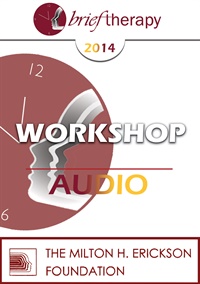
- Average Rating:
- Not yet rated
- Topic Areas:
- Workshops | Mindfulness | Intimacy | Couples Therapy | Relationships
- Categories:
- Brief Therapy Conference | Brief Therapy Conference 2014
- Faculty:
- Ronald Siegel, PsyD
- Duration:
- 1:54:20
- Format:
- Audio Only
- Original Program Date:
- Dec 12, 2014
- Short Description:
- Psychotherapists and clinical researchers are finding that ancient Eastern meditative techniques, originally solitary practices refined by hermits, monks, and nuns, are proving to be remarkably useful for facing interpersonal challenges. This workshop will explore how mindfulness meditation can help our clients and us develop the affect tolerance and capacity to be with and understand others that are critical for successful intimate relationships. You’ll leave knowing the three core elements of mindfulness practice, how to use mindfulness to react less personally to the inevitable ups and downs of interpersonal life, and how interpersonal mindfulness techniques can enhance therapeutic, romantic, and parent-child interaction.
- Price:
- $15.00 - Base Price
Credit available - Click Here for more information
- Average Rating:
- Not yet rated
- Topic Areas:
- Speeches | Relationships | Trauma | Continuing Education | Brief Therapy | Intimacy
- Categories:
- Brief Therapy Conference | Brief Therapy Conference 2018 | Online Continuing Education
- Faculty:
- Laura Brown, PhD
- Course Levels:
- Master Degree or Higher in Health-Related Field
- Duration:
- 1:03:11
- Format:
- Audio and Video
- Original Program Date:
- Dec 08, 2018
- Short Description:
- BT18 Speech 14 - Helping Trauma Survivors to Have the Relationships They Deserve - Laura Brown, PhD Survivors of complex childhood trauma --systemic abuse, neglect, and disrupted attachment schemata -- enter adulthood with internal working models of relationship that often lead them into difficult and painful connections with others. I will address the specific challenges in empowering these survivors to stop "paying the price of admission" to intimacy, and discuss how therapists can find effective strategies for addressing pre-verbal and early verbal core beliefs about self, being lovable, and being safe in relationships.
- Price:
-
Sale is $29.00
price reduced from Base Price - $59.00

- Average Rating:
- Not yet rated
- Topic Areas:
- Dialogues | Affairs | Couples Therapy | Intimacy | Sex and Sexuality
- Categories:
- Couples Conference | Couples Conference 2004
- Faculty:
- Esther Perel, MA, LMFT | Janis Abrahms Spring, PhD, ABPP
- Duration:
- 55:21
- Format:
- Audio Only
- Original Program Date:
- Mar 26, 2004
- Short Description:
- This lively dialogue brings two influential clinicians together to explore affairs, eroticism and the shifting meanings of intimacy. Through audience questions and spirited exchange, they examine secrecy, monogamy, cultural norms and the private imagination, offering contrasting but complementary perspectives. Participants hear how desire, boundaries, contracts and autonomy shape modern relationships, and how therapists can navigate the tensions between honesty, privacy, commitment and erotic vitality.
- Price:
- $15.00 - Base Price

- Average Rating:
- Not yet rated
- Topic Areas:
- Keynotes | Couples Therapy | Neurobiology | Intimacy | Neuroscience | Attention Deficit Disorder (ADD)
- Categories:
- Couples Conference | Couples Conference 2004
- Faculty:
- Daniel Amen, MD
- Duration:
- 57:26
- Format:
- Audio Only
- Original Program Date:
- Mar 27, 2004
- Short Description:
- This keynote explores how brain function shapes intimacy, trust, and emotional connection in relationships. Participants learn how areas like the prefrontal cortex, temporal lobes, and limbic system influence empathy, impulse control, and attachment. The session offers a brain-based framework for understanding marital conflict, trauma, and communication struggles, showing how optimizing brain health can restore compassion, flexibility, and lasting partnership.
- Price:
- $15.00 - Base Price
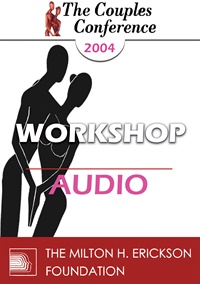
- Average Rating:
- Not yet rated
- Topic Areas:
- Workshops | Affairs | Couples Therapy | Trauma | Intimacy
- Categories:
- Couples Conference | Couples Conference 2004
- Faculty:
- Janis Abrahms Spring, PhD, ABPP
- Duration:
- 1:52:35
- Format:
- Audio Only
- Original Program Date:
- Mar 26, 2004
- Short Description:
- This workshop offers a clear, compassionate roadmap for helping couples recover from infidelity. Using a three stage model, it shows how to name the trauma of discovery, understand the unfaithful partner’s experience and make thoughtful, not impulsive, decisions about reconciliation. Participants learn concrete ways to rebuild trust, address romantic and unrequited love, challenge unrealistic beliefs about marriage and guide partners toward more mature, intentional connection.
- Price:
- $15.00 - Base Price
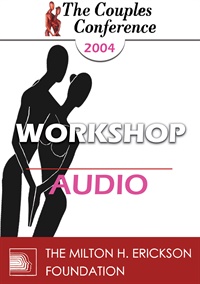
- Average Rating:
- Not yet rated
- Topic Areas:
- Workshops | Couples Therapy | Intimacy | Multicultural | Sex and Sexuality
- Categories:
- Couples Conference | Couples Conference 2004
- Faculty:
- Esther Perel, MA, LMFT
- Duration:
- 1:28:38
- Format:
- Audio Only
- Original Program Date:
- Mar 26, 2004
- Short Description:
- This workshop examines the cultural pressures that shape domesticated sex and the puzzling inverse correlation between greater emotional intimacy and the loss of sexual desire. It will demonstrate how to help couples draw pleasure from the hidden, the suggestive and the uncanny while also respecting their needs for safety and stability. Using case examples, we will explore how to grant the body its profound capacities for communicating in its own language.
- Price:
- $15.00 - Base Price
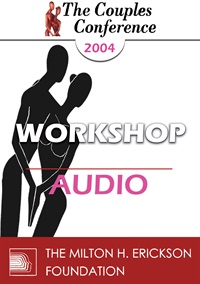
- Average Rating:
- Not yet rated
- Topic Areas:
- Workshops | Relational Life Therapy Model (RLT) | Couples Therapy | Intimacy | Therapist Techniques
- Categories:
- Couples Conference | Couples Conference 2004 | Pioneers in Couples and Family Therapy
- Faculty:
- Terry Real, LICSW
- Duration:
- 1:43:38
- Format:
- Audio Only
- Original Program Date:
- Mar 27, 2004
- Short Description:
- This workshop presents key principles of Relational Recovery Therapy, focusing on resolving intimacy issues through structured dialogue, clear roles, and mutual accountability. It outlines the importance of addressing self-medication, psychiatric issues, and acting out before working on connection. Practical guidance includes teaching skills, setting respectful boundaries, and fostering support networks. The approach emphasizes assertive communication and shared responsibility to build healthy, empowered relationships.
- Price:
- $15.00 - Base Price

- Average Rating:
- Not yet rated
- Topic Areas:
- Workshops | Couples Therapy | Intimacy | Forgiveness | Healing
- Categories:
- Couples Conference | Couples Conference 2005
- Faculty:
- Janis Abrahms Spring, PhD, ABPP
- Duration:
- 1:59:31
- Format:
- Audio Only
- Original Program Date:
- Mar 04, 2005
- Short Description:
- This workshop presents an in depth, practical model of “acceptance,” a healing alternative when an offender cannot or will not make amends. Participants learn how hurt parties can honor their emotions, reduce obsessive rumination, protect themselves from further harm, and see the offender’s behavior in a broader context without excusing it. Through vivid clinical examples, the session offers a step by step roadmap for resolving injury, reclaiming dignity and moving forward even when genuine forgiveness is not possible.
- Price:
- $15.00 - Base Price

- Average Rating:
- Not yet rated
- Topic Areas:
- Workshops | Couples Therapy | Neurobiology | Relationships | Neuroscience | Intimacy
- Categories:
- Couples Conference | Couples Conference 2005
- Faculty:
- Pat Love, EdD
- Duration:
- 1:40:11
- Format:
- Audio Only
- Original Program Date:
- Mar 04, 2005
- Short Description:
- The new brain science explains many of the mysteries of love and offers new hopes for troubled relationships. Neuro-scientific approaches are used to address the most common reason cited for divorce, i.e. growing apart. Three clinical techniques will be presented which are specifically designed to create an intimate bond between two people and pave the way to grow together instead of apart. Lecture, video, handouts and experiential exercises will be used.
- Price:
- $15.00 - Base Price

- Average Rating:
- Not yet rated
- Topic Areas:
- Workshops | Couples Therapy | Sex and Sexuality | Intimacy | LGBTQ
- Categories:
- Couples Conference | Couples Conference 2008
- Faculty:
- Esther Perel, MA, LMFT
- Duration:
- 2:00:39
- Format:
- Audio Only
- Original Program Date:
- Apr 26, 2008
- Short Description:
- The story of sex in committed modern couples is one that often tells of a dwindling desire that includes a long list of sexual alibis, claiming to explain the inescapable death of Eros. The absence of fantasy, the proliferation of pornography and affairs, as well as a lack of understanding of the nature of erotic desire all contribute to the predicament. This workshop examines the cultural pressures that shape domesticated sex and the puzzling inverse correlation between greater emotional intimacy and the loss of sexual desire.
- Price:
- $15.00 - Base Price

- Average Rating:
- Not yet rated
- Topic Areas:
- Workshops | Couples Therapy | Neuroscience | Intimacy
- Categories:
- Couples Conference | Couples Conference 2008 | Pioneers in Couples and Family Therapy
- Faculty:
- Stan Tatkin, PsyD, MFT
- Duration:
- 2:08:28
- Format:
- Audio Only
- Original Program Date:
- Apr 27, 2008
- Short Description:
- This workshop explores a developmental psychobiological approach to intimacy, showing how the brain’s automatic responses, attachment styles, and arousal levels shape relationship dynamics. It covers how subtle cues like eye contact and microexpressions reveal emotional states, and why co-regulation is key to managing conflict. The approach supports using longer, more frequent sessions to help couples stay connected and repair quickly when things go wrong.
- Price:
- $15.00 - Base Price

- Average Rating:
- Not yet rated
- Topic Areas:
- Workshops | Couples Therapy | Multicultural | Sex and Sexuality | Intimacy
- Categories:
- Couples Conference | Couples Conference 2008
- Faculty:
- Esther Perel, MA, LMFT
- Duration:
- 2:16:00
- Format:
- Audio Only
- Original Program Date:
- Apr 27, 2008
- Short Description:
- Couples’ expectations about the role of sexuality in intimate relationships have changed dramatically over the past 40 years. We will explore the main ideas of the romantic ideal: how we want our partner to fulfill our needs for connection, belonging and continuity, as well as give the sense of transcendence, mystery and passion. Examining the cultural values of love and respect, freedom and responsibility, and interdependence vs. autonomy, we will map a culturally relevant approach to work with the dilemmas of desire in couples. We also will probe the difference between clearly assigned gender role repartition and the post-feminist egalitarian model.
- Price:
- $15.00 - Base Price

- Average Rating:
- Not yet rated
- Topic Areas:
- Workshops | Couples Therapy | Neuroscience | Intimacy
- Categories:
- Couples Conference | Couples Conference 2008
- Faculty:
- Louis Cozolino, PhD
- Duration:
- 2:23:03
- Format:
- Audio Only
- Original Program Date:
- Apr 27, 2008
- Short Description:
- In the course of human evolution, our brains have been shaped by countless adaptational challenges resulting in an organ functioning simultaneously in the conscious present and our primitive and hidden past. This presentation will explore aspects of the human brain which make sustained intimate relationships both possible and problematic.
- Price:
- $15.00 - Base Price

- Average Rating:
- Not yet rated
- Topic Areas:
- Keynotes | Couples Therapy | Sex and Sexuality | Intimacy
- Categories:
- Couples Conference | Couples Conference 2009
- Faculty:
- Esther Perel, MA, LMFT
- Duration:
- 53:02
- Format:
- Audio Only
- Original Program Date:
- May 02, 2009
- Short Description:
- CC09 Keynote 03 - Mating and Captivity: The Paradox of Sex and Intimacy - Esther Perel, MA, LMFT
- Price:
- $15.00 - Base Price

- Average Rating:
- Not yet rated
- Topic Areas:
- Workshops | Couples Therapy | Love | Relational Life Therapy Model (RLT) | Intimacy
- Categories:
- Couples Conference | Couples Conference 2009 | Pioneers in Couples and Family Therapy
- Faculty:
- Terry Real, LICSW
- Duration:
- 1:55:39
- Format:
- Audio Only
- Original Program Date:
- May 01, 2009
- Short Description:
- This session presents a practical approach to Relational Life Therapy™, focusing on the interplay between grandiosity and shame, and the importance of addressing both indulgence and deficiency. It introduces the concepts of “latent” and “blatant” partners, emphasizing leverage, empowerment, and therapist transparency. Strategies include setting safe conditions for therapy, managing untreated disorders, calling forth the functional adult, and fostering relational joy over mere gratification.
- Price:
- $15.00 - Base Price



